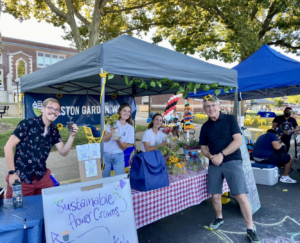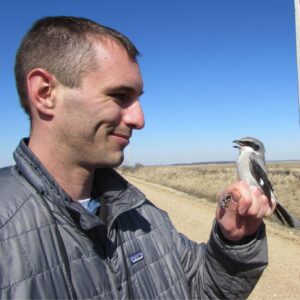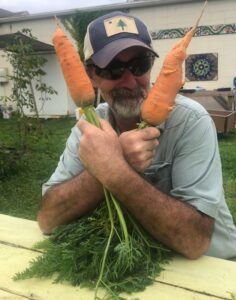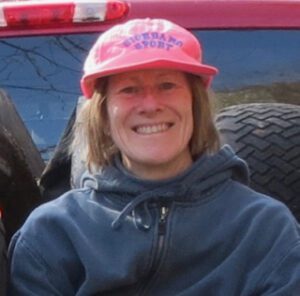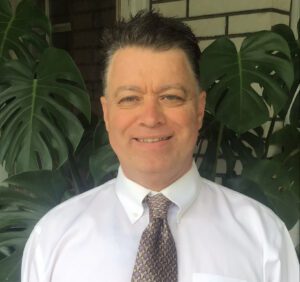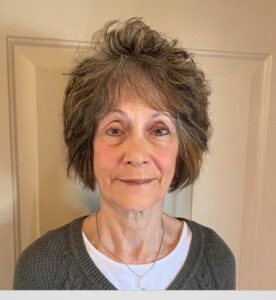Local Climate Action Stories
“Grow some food, get some time away from work and out in nature, it’s just good for your mental health."
Miranda Wilcha: Community Gardens/Composting, Greater Easton Development Partnership (GEDP)
Action Taken:
The city of Easton is home to six community gardens and Miranda Wilcha keeps them running smoothly. Wilcha is the Community Gardens and Compost Coordinator at the Greater Easton Development Partnership (GEDP). She is passionate about community engagement and being able to equip people to feed themselves, and spends her time making accessible programs while also lowering Easton’s carbon footprint. Having community gardens in urban spaces addresses the issue of food deserts and affords people the opportunity to grow their own food that they might not otherwise have the chance to. The community gardens are free to anyone who wants to try and Miranda encourages all to try gardening even if it is new to them. Soil care, gardening tools, and sometimes even plants are provided. Along with her work at the community gardens, she helps run Easton Garden Work’s composting program which is free and completes the food loop with a compost pile provided at the Lower Hackett Community Garden for use on spring and fall compost delivery days.
Challenges and Tips:
Starting your own garden does not require years of experience and people like Miranda Wilcha are here to help. Creating a welcoming and accessible space for a diverse range of residents can be challenging. The freedom to grow food from the land is for people of all ages and backgrounds. Living in an urban setting should not limit these possibilities to connect with the environment and your community. After the COVID-19 pandemic, Wilcha is excited to see how sharing spaces with neighbors can inspire others to garden and be stewards of the land. Increased enthusiasm and community engagement surrounding growing food can help Easton reach its Climate Action Plan goals. The community gardens and composting services are free and getting involved benefits you and your community.
What can you do?
Here are a few resources to get you started…
Are you a resident of Easton? Get a garden plot and learn more about Easton Garden Works here: https://westwardeaston.org/gardens/
To learn more about the Greater Easton Development Partnership click here: https://eastonpartnership.org/ Interested in workshops from Easton Garden Works? Get started here: https://westwardeaston.org/gardens/garden-workshop-series/
“You have to think about the environmental health consequences to the choices that we make collectively…Now is a great time to put up solar. I think people will see the long run financial benefits of it.”
Mike Butler: Solar Panels; Lafayette College professor
Action Taken:
Mike Butler is a biology professor at Lafayette College, an avid bird watcher, and the proud owner of solar panels that are paying for themselves. Butler has solar panels on the roof of his garage that generate a 100% energy offset. This means that Butler’s home generates the same amount of electricity that it uses in a year. Because Butler’s house has a net zero energy usage, he does not have to pull any electricity from his utility company. This, in turn, lowers the amount of emissions entering the atmosphere and helps to meet the Easton Climate Action Plan’s goals. Butler may never have to pay another electric bill again and believes that the initial cost of solar panel installation is worth the financial and environmental benefits in the long run.
Challenges and Tips:
Mike Butler was fortunate to have a garage roof that received enough sunlight and could support the number of solar panels he wanted. If you think that solar panels could be a fit for your home do not hesitate to get started with the consultation and installation process. You do not have to have a full roof of solar panels or 100% energy offset to see the financial and environmental benefits that come with renewable energy.
What can you do?
Interested in learning how to get a 30% tax credit on your solar panel installation costs? Look here:
https://www.energy.gov/eere/solar/homeowners-guide-federal-tax-credit-solar-photovoltaics
What are the best solar panels for your home?
https://www.forbes.com/home-improvement/solar/best-solar-panels/
“I try to keep the integrity of the native plants and native soil while ensuring the farm is as regenerative as possible. We want to get as much produce out there to help people who need vegetables in this community.”
Mark Reid: Easton Urban Farm
Action Taken:
Mark Reid is the farm manager of the Easton Urban Farm with the goal of providing fresh local produce to the community, specifically areas of Easton that are food deserts. A food desert is an area that has limited access to affordable and nutritious food. The farm works in conjunction with the Neighborhood Center’s Food Pantry to ensure that all families can access healthy food. Reid implements sustainable initiatives to make sure that the farm produces enough produce but is also regenerative and keeps a balance between farming and the natural landscape in mind. Under his care, the farm uses an energy efficient drip irrigation system and rain barrel water collection to aid in the watering of plants. The farm utilizes organic mushroom soil that is locally sourced and plants pollinators for the bees they take care of as well as the wild bees. The farm also has a solar powered high tunnel greenhouse to protect and grow crops for longer seasons and they repurposed an old food truck into a large refrigeration unit. Mark Reid and those who work or volunteer their time on the farm are passionate about feeding Easton in an environmentally friendly fashion.
Challenges and Tips:
Supporting locally grown food is one way to support the implementation of Easton's Climate Action Plan and volunteering at the farm is a great way to get involved! Even if you cannot grow food in your backyard or at a community garden, you can take advantage of opportunities to promote local agriculture through working with the Easton Urban Farm. If that is not an option for you then look into how you can repurpose old materials in your home. It takes creativity to repurpose materials like the urban farm does, but reusing what you have is a sustainable option that reduces material waste and can save you the cost of buying something new. The elimination of food deserts is not an easy task but with increased community engagement and outreach the goals of the Easton Urban Farm can be reached.
What can you do?
Check out the Easton Urban Farm’s website and volunteer: https://sites.google.com/site/eastonurbanfarm/
Interested in food pantries? Click here: https://www.eastonareaneighborhoodcenter.org/food-programs
“Be part of a solution and take positive steps towards reducing energy consumption as a whole. It's a positive for Earth and for your pocketbook.”
Colt Houser: Resident in the West Ward
Action Taken:
When Easton resident, Colt Houser, bought his home he had the goal of building a better thermal envelope. A thermal envelope serves to keep the air inside your home separate from the air on the outside. How efficient insulation, windows, walls, floors, and doors are all components of having a thermal envelope that ensures the quality of the indoor environment. Houser focused on installing energy efficient windows that have weather-tight seals that ensure his home can stay warm in the winter and cooler in the summer. Along with improving his home's thermal envelope, Houser installed solar panels on the roof of his home to offset his electric bill. His solar panels account for about 45% of his yearly electricity needs. Houser’s electric bill is also around 55-60% of what it used to be before he was using solar energy. His ability to consume less and reduce his carbon footprint makes utilizing solar energy and implementing efficiency upgrades and home improvements worth it.
Challenges and Tips:
The energy efficient renovations that Colt Houser made to his home required some patience and planning. By implementing weatherization strategies and sticking to his energy efficiency goals Houser saved time and money in the long run. Houser had to use what vertical space he had on his roof for his solar panel installation. Though his roof cannot support the number of solar panels that would completely offset his energy bill, every little bit makes a difference.
What can you do?
Learn more about thermal envelopes here:
https://atticconstruction.com/blog/what-is-a-thermal-envelope/
Look into a home energy audit here:
https://www.energy.gov/energysaver/home-energy-assessments
Need help with the weatherization of your home? Click here: https://www.energy.gov/energysaver/home-comfort
“Give it a try and see what develops! There are a whole lot of little things that people can do that are not as difficult as they seem.”
Diane Halasz: Easton Resident with Watershed Friendly Property Certification
Action Taken:
Have you ever wondered what you can do as a homeowner to live a more sustainable life? Diane Halasz asked herself the same question before she earned her Watershed Friendly Property Certification. A watershed is any land that channels rainfall and snowmelt to creeks, streams, and rivers, and eventually to the ocean. All people live in a watershed and should take responsibility to ensure that the water that filters through their property is clean and moves slowly into river systems and groundwater. Diane Halasz took it upon herself to learn how to build a better backyard. She found ways to keep the water on her property instead of washing into the road to become polluted and contribute to stormwater runoff. Diane Halasz does not have the typical lawn as she found that native plants and perennials are the true experts in the business of creating a watershed friendly property. She swapped out her lawn for shrub beds which saves time and money since she has little to no lawn maintenance.
Challenges and Tips:
Diane Halasz follows the central idea of keeping nature on her property. If changing your entire lawn around like Diane appears to be too challenging or time consuming, there are other ways you can keep your watershed healthy. Try to minimize your use of pesticides and herbicides as well as your use of ice melting products such as salt. Pick up your pet waste and properly dispose of it immediately. It is very beneficial for the soil and those living in it to leave fallen leaves on the ground but, if you do not wish to do that, then mulch or compost your lawn clippings and leaves. Be sure to wash your car with non-toxic soap and allow your lawn to only be watered by rainfall. Diane encourages anyone looking to try something new with their property to go to a native plant nursery for guidance and to think about how changing your lawn can benefit the entire ecosystem and help Easton reach its Climate Action goals.
What can you do?
Interested in earning your own Watershed Friendly Property Certification or just learning more about what you can do? Click here: https://watershedfriendlypa.org/
Find out what watershed you live in!
https://extension.psu.edu/how-to-identify-your-local-watershed-in-pennsylvania
“A lot of these solutions can be local and you can learn on your own by trial and error.”
James Cox: Financial Advisor with a focus on social responsibility
Action Taken:
Easton resident James Cox is a financial advisor whose work focuses on socially responsible investing. Cox encourages his clients to divest, or remove their investments, from the fossil fuel industry and put their money into industries with greener futures. Choosing alternative investment strategies that support environmental health can aid in reaching the goals of the Easton Climate Action Plan. Cox is on a mission to raise awareness about how investment choices can positively impact climate action.
Challenges and Tips:
James Cox has observed that people may feel discouraged at the thought of changing where they invest or divest their money. In seeking climate action the importance of a person's money matching their values is less intimidating than it seems on the outside. Working with professionals who share your environmental values is one way to help support climate action. Solutions to the climate crisis can take a range of forms, from behavioral to financial. Individuals have the ability to make decisions that can help the wellbeing of not just themselves, but the planet in the process.
What can you do?
Here are a few resources to get you started…
If you want to learn more about what James Cox does please visit https://jamesacox.com/about/
The Easton Climate Action Plan can be found here https://nurturenaturecenter.org/wp-content/uploads/2021/11/EastonCAPDraft_7.7.2021_new.pdf
Also visit the Nurture Nature Center’s Climate Action Plan Dashboard to stay updated on Easton’s climate related news https://nurturenaturecenter.org/easton-climate-action/
“We take from the Earth and have to give back too and every little bit matters.”
Liz Tempelton
Action Taken:
As an Easton community member Liz Tempelton enjoys growing vegetables at the community gardens. Gardening has given Liz the opportunity to connect with nature and find a hobby that she loves. Volunteering at the gardens and having her own plot allows Liz to engage with the community and learn from what other gardeners are doing. She grows cabbage, peppers, tomatoes, lettuce, spinach, and kale just to name a few vegetables. Caring for the earth and growing food in this way aligns with the Easton Climate Action Plans goals as well as provides benefits to people like Liz.
Challenges and Tips:
Liz has always had an interest in plants but did not have the space at her home to start a garden. With only a patio and very little green space Liz set up a raised garden bed on the cement and found creative solutions by having individual planters grow flowers to support pollinator populations. With the use of the free community garden plots, Liz has been taking advantage of the resource that Easton offers to grow her own food and help with sustainability too. Growing your own food is something anyone can learn to do and Liz proves that you do not need a backyard in order to do so.
What can you do?
Short on space? Learn how to upcycle old milk cartons into herb gardens here:
For news and updates on what's going on with the community gardens in Easton look here:


